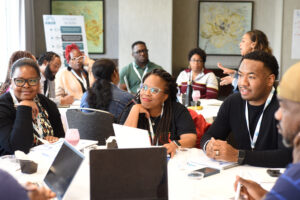Remember your favorite elementary school teacher? He or she taught you how to do a lot of things. Some of them were academic skills, like subtraction and decoding words. Some were not—like sparking a lifelong passion or learning to see a project through to its finish. Most anecdotes about great teachers are along those lines (including in Paul Tough’s recent book).
The point is that academic outcomes are not the whole story. I say that as someone who believes deeply in measuring teacher contributions to student learning and in using those measurements to inform our opinion of a teacher’s job performance. I remain convinced that of the many roles teachers play, advancing student learning is the most important.
But there is a difference between saying something is important and saying it’s the only thing that matters. The growth teachers foster in the non-cognitive domain is also critical.
An economist at Northwestern, Kirabo Jackson, recently published a thoughtful and rigorous paper showing how differently teachers perform when it comes to these softer skills. There are differences among teachers when it comes to the way they boost cognitive results (measured by test score growth) and non-cognitive results (measured by attendance, suspensions and dropout rates)—and those differences pay dividends in terms of life outcomes in both cases.
What should we do with this information? Some will make the argument that if there’s more than one way for a teacher to help students, we can’t judge teacher performance solely on whether that teacher raises test scores. I would agree—and luckily, there is no serious suggestion to do so.
But should we downplay the attention paid to test score improvements? Only if we are transferring that attention to something that does a credible job of capturing the non-cognitive contributions that matter.
In many schools, the only measures we have besides test score growth are classroom observations. At TNTP, we believe in the power of observations done well. But most observations tend to be short and superficial, and they assume that an adult can discern how students are reacting to instruction. To use observations to assess teacher impact on non-cognitive skills, we would need to believe that an observer can tell whether a teacher will inspire students to persist, to show up, to fight through.
Personally, I’d rather ask the kids. At TNTP, we collect a number of data points on the teachers we have recruited and trained, and use it to determine whether teachers earn permanent certification. Student surveys have become a valuable piece of the puzzle, precisely because they shed some light on the some of the non-cognitive elements of instruction, such as whether they make learning enjoyable. We tweaked our survey this year to add more non-cognitive questions and will continue to evolve the battery each year as we learn more.
Research like the Jackson paper can sometimes seem like a problem, because he’s injecting complexity where it’s hard enough to grapple with the complexity we’ve got. But it’s also an opportunity to admit the obvious and address what probably should have been addressed a long time ago. It seems far better to develop reasonable ways of valuing different teacher contributions than to give up and pretend that we can’t see the differences.








